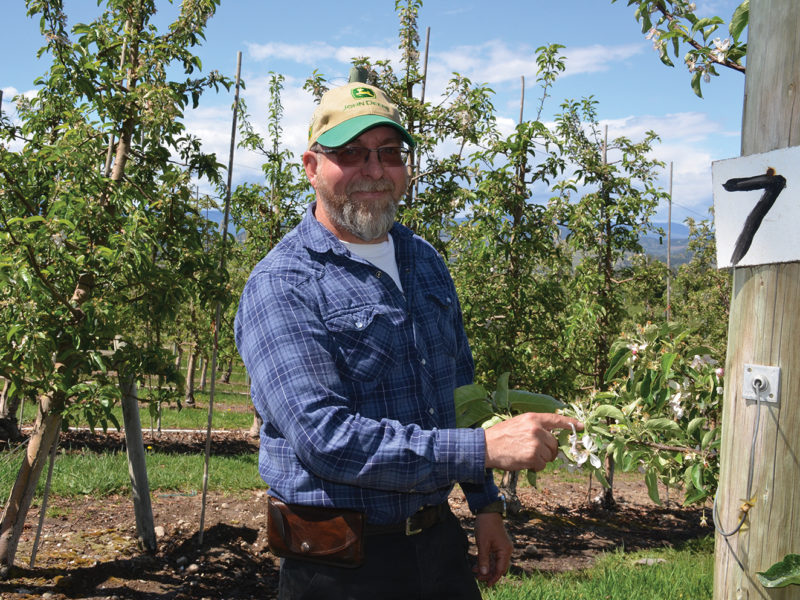KELOWNA – Learning from some of the best can help you be one of the best is a philosophy that’s served Kelowna orchardist Shane Witzke well.
The BC Fruit Growers Association named Witzke as recipient of this year’s Golden Apple award at its annual general meeting in February.
“I rely on what my field service advisors tell me,” says Witzke. “They have the expertise and the experience to help me with the technical issues in my orchard and then it’s up to me carry out those recommendations.”
Top-quality advice came early for Shane, who remembers learning how to prune from long-time BC Tree Fruits Co-op field person Hank Markgraf, now an independent horticultural consultant.
“Hank taught me how to prune in the early 90s and then my dad let me take over a two-acre block of Galas,” recalls Witzke. “I was able to prune more of the orchard when I got the hang of it.”
Witzke’s dad certainly knew when Shane was doing a good job. Brian Witzke was a Golden Apple winner himself in 1992.
“Our orchard is known for consistent quality,” says Shane Witzke. “I believe we are considered to be in the top 10% of growers.”
Indeed, Northview Orchards, on the Belgo bench in southeast Kelowna, is often a venue for industry events. Former BC premier Christy Clark visited in 2014 to announce renewal of the industry replant program, and the orchard was a stop on the International Fruit Tree Association tour in the summer of 2018. It hosted a pruning demonstration by Washington State University professor Stefano Musacchi last year just before the pandemic shut down events.
“It’s a really good-looking orchard,” says Markgraf, who nominated Witzke for the Golden Apple award.
“When I worked with them last spring you could see what a good job they had done with their pruning,” Markgraf explains. “Everything was so uniform and it set them up for a fantastic bloom. They also did an excellent job with their chemical thinning. They took a chance to do it early and it worked.”
That work, starting in late winter, is key to setting up a successful growing season, says Markgraf.
“Most of the work needs to be done through bloom time so that all that is left is hand thinning. You don’t want to be playing catch up through the growing season,” he explains. “But it’s not just the current year. It is all the careful work the Witzkes have done over the last 20 years to get them there.”
Learning from others is a family trait. Brian Witzke was fortunate to join a tour the BC Ministry of Agriculture organized in 1986 that introduced growers to orchard practices in Europe. He saw apples being grown on a post-and-wire (vertical axis) system, an early version of the high-density super-spindle plantings common today.
“Dad was one of the first to put in post-and-wire in the valley,” notes Shane. “And we have some of the oldest plantings of Royal Galas in BC.”
Those trees are now more than 20 years old. As Galas have slipped in popularity, Northview has grafted many of the trees over to Ambrosia or Honeycrisp, or pulled out for a full replant into high-density systems.
“The replant program has been very important for us,” says Witzke. “It only covers a fraction of the some-$30,000 an acre cost, but it’s a help.”
Growing varieties that are popular in the market, while being diversified and timing the work load, are an important part of the Witzkes’ strategy. The 30-acre property purchased by Shane’s grandfather in 1946 now has blocks of Royal Gala, Pacific Gala, Spartans, Ambrosia and Honeycrisp. There is a new, two-acre block going in that Witzke will only describe as “a new variety” with a twinkle in his eye.
They make their choices carefully.
“I’d love to grow Pink Lady for the high returns, but we are too far north for it to ripen consistently before the fall frosts,” he says, speaking from experience.
The Witzkes lost a few bins of apples to the late October frost last fall when they could not find the workers to pick them in time. And the January freeze this year damaged a four-year-old Honeycrisp block.
“The young trees had a hard time with the -22°C, and it’s a real shame because they gave their first light crop last year,” he says.


 Mushrooms add value to cut blocks
Mushrooms add value to cut blocks